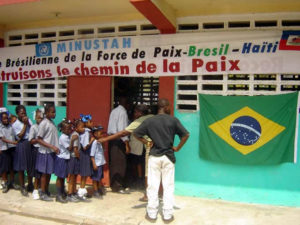
A couple of days ago I was in San Juan, Puerto Rico where I witnessed a substantial U.S. military presence, a logistical rearguard for deployment to Haiti. While I have been a critic of many U.S. military interventions, the earthquake relief effort is impressive, inspiring. Even Brazilian critics of the rapid U.S. military insertion should recognize how much good the U.S. can do with the best of intentions.
The day before yesterday the government of Brazil honored the eighteen Brazilian soldiers who lost their lives in the devastating earthquake that has changed Haiti forever. These soldiers were part of the United Nations Stabilization Mission, known as MINUSTAH, that has tried to provide security and stability to a society ripped apart by dire poverty, bloody political violence, and the oscillating tides of U.S. imperialism and neglect over the last two centuries.
Today, we are all busy finding our modest ways to contribute to the relief effort and assess our human responsibility in the face of such human suffering. There is reason to be hopeful that both Brazil and the U.S. can deepen bilateral cooperation to assist Haitians and their government repair their nation and heal their people. Already it appears that Brazil, Canada, France, and the U.S. are taking the lead in coordinating relief efforts, and are preparing a Haiti relief conference slated for Montreal later in the week.
After remarking that Brazil should “adopt” Haiti, President Lula signed an executive order releasing approximately $150 million for the country’s relief efforts in Haiti, including its military deployment under MINISTAH. The Brazilian Senate is now in the process of authorizing another 800 troops to be deployed to reinforce the MINISTAH presence and respond to urgent calls for greater security in the face of criminal chaos in the streets of the Haitian capital and throughout many of the informal refugee camps. Also, the Ministry of Health, working with the Brazilian Air Force, sent off 150 tons of medical supplies and is busy preparing a delegation of volunteer doctors and medical professionals for their arrival in Haiti later this week.
Today, Foreign Minister Celso Amorim will arrive in Haiti to assess the damage and meet with Haitian President Rene Prevál before heading off to the Montreal conference. Many Brazilians complained publically about the U.S. military occupation of the Port-au-Prince airport and the presidential palace, both now serving as command and control centers for U.S. military forces. Yet, such criticism has taken a back seat to Brazil’s recognition of their own lost soldiers and citizens, along with the extension of the country’s relief efforts. In fact, General Floriano Peixoto, the Brazilian general in charge of MINUSTAH, commented on the large U.S. military deployment in the newspaper O Globo,
“There is not a problem. The American presence is professional, cordial, and respected… it has a defined role. The actions of the Americans and Canadians are humanitarian. The military mission of the MINISTAH remains under my charge.”
His comments counter Brazilian criticism of the U.S. military deployment, especially as it concerned control over the Port-Au-Prince airport and delays in authorizing the landing of Brazilian airplanes loaded with relief supplies. One should not doubt the Brazilian frustration with the U.S. military command in the first few days following the earthquake (or course such frustration confirms Brazil’s slow military deployment in the face of such evident need), but it seems that both governments are moving forward in closer cooperation after conversations between Presidents Lula and Obama as well as Minister Amorim and Secretary of State Hillary Clinton.
The real test for Brazil, and bilateral cooperation between Brazil and the U.S., will follow the multilateral conference in Montreal this week. Can Brazil find its proper role in the long term efforts to rebuild Haiti and send it along a path to peace and prosperity? Can Brazil work with the U.S., Canada, and France to synergize efforts to achieve efficiency while scaling up an international campaign to rebuild Haiti? Most importantly for the critics of the U.S. military, can Brazil keep the U.S. “honest” in its dealings with the fractured government of Haitian President Prevál?
More than ever, the Haitian people need Brasilia and Washington to work out their differences, set aside their intractable grievances, and get on with the work of rebuilding Haiti.
For the sake of the Haitians and are own human dignity, we should all insist that the governments of Lula and Obama get it right, now.